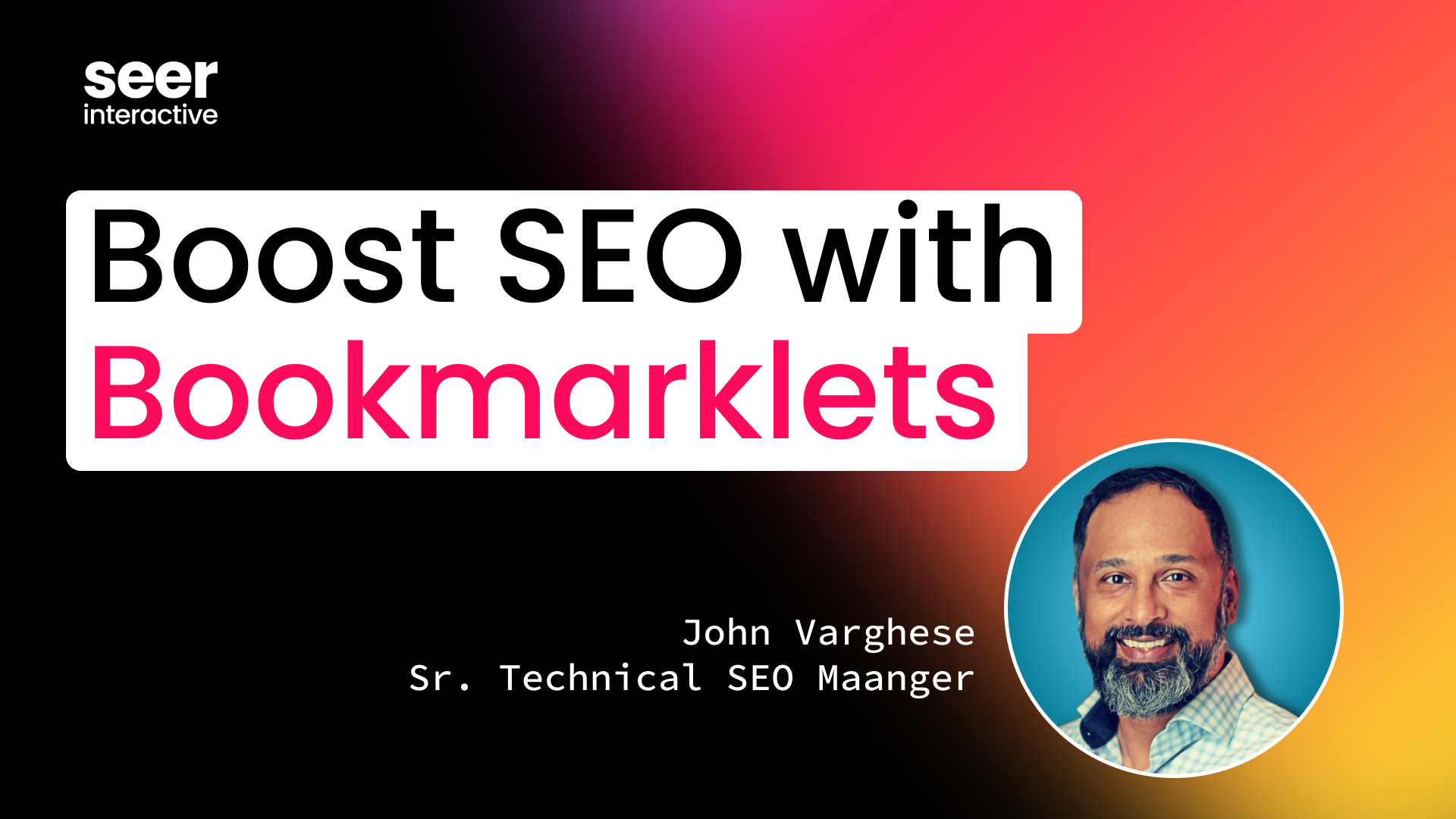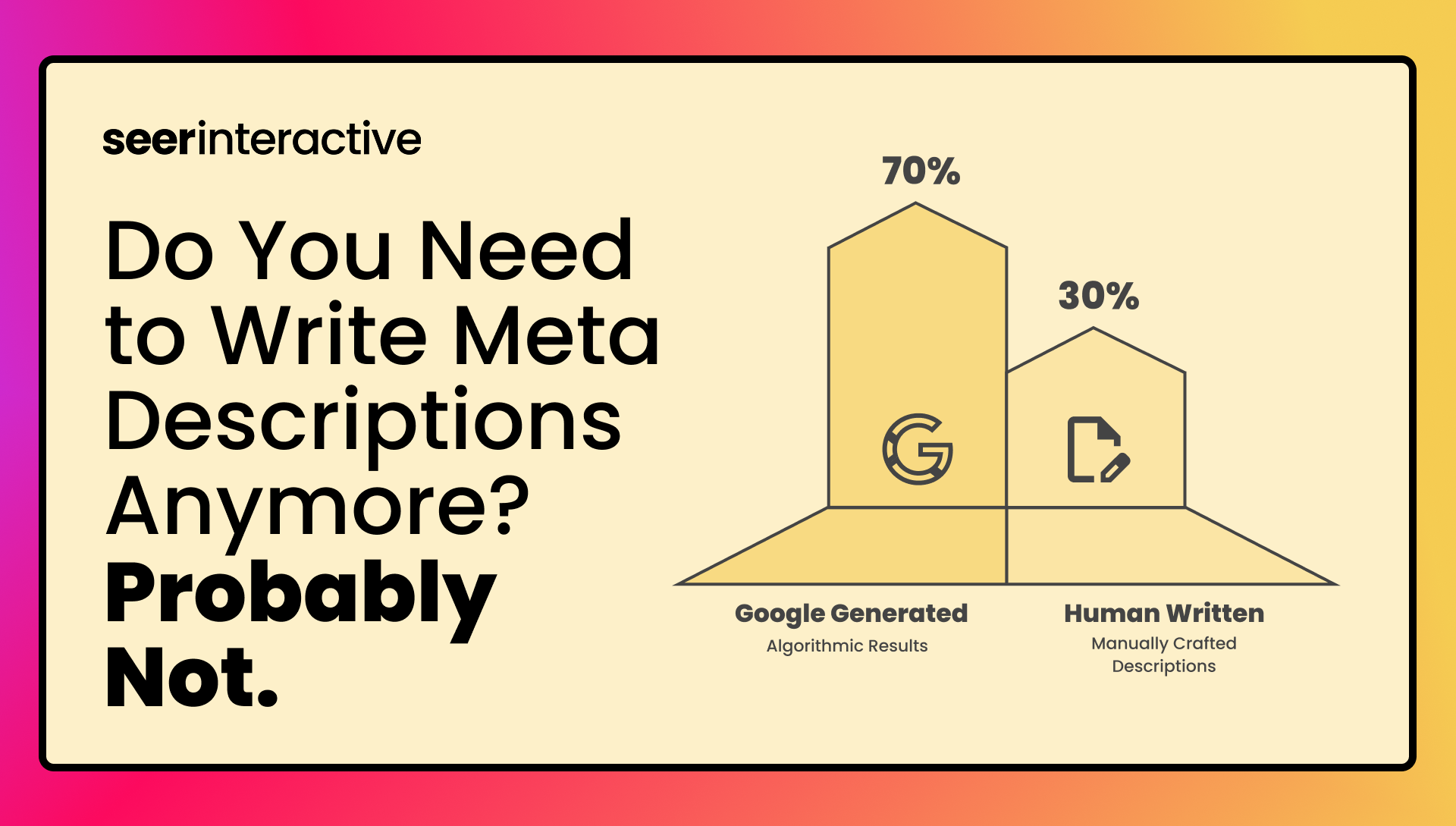TL;DR: Googlebot is getting smarter in terms of giving users what they want, when they want it and how they want it. Empathy is at the heart of virtually all recent changes made by Google and thus, it is critical for SEOs to approach strategy in a selfless manner. When we approach content creation and user experience with empathy, our chances of creating content that Google will serve to users drastically increases.
It has been truly remarkable to watch Googlebot evolve to become perhaps the most empathetic non-human in the world. Google has really walked the walk in terms of understanding what users want and giving it to them. Recent updates like Panda, Penguin, and Mobile are all examples of Google practicing Kaizen.
Wil Reynolds, the founder of Seer, has always approached SEO in a manner which reflects his selfless nature. This approach is about analyzing search data to figure out what users want and then going above and beyond to offer them the highest quality content and well-presented solutions. This way of thinking about strategy helped lay the foundation for what has grown into our SEO process here at Seer. And what is most interesting about it, is that this approach has attracted so many talented professionals to Seer—marketers and non-marketers alike. Just genuinely good, smart people. How? Because it’s not all about marketing; it’s about helping brands fulfill a promise to their customers. It’s about caring. It's about truly listening to what people want, and then using Google as a vehicle to engage with them, on their terms, with what you have created for them.
It takes a special kind of person to be a successful SEO today, because Googlebot is your partner and the robot holds its partners to high standards of selflessness, a core tenet of empathy. So if you’re selfish, now might be a good time to exploring a different marketing channel.
There are so many ways empathy can support the ROI of your SEO. Let’s explore some of them here.
- Target keywords you’re never going to rank for
- Donate your data
- Start conversations that have nothing to do with you (or your products)
- Find joy in other people’s happiness
1. Target keywords you’re not going to rank for
The goal here is to improve user engagement and the overall quality of your content, helping you win in the Panda-era. Wanting to rank for every single keyword is selfish. The goal is not to rank for every term that you target in your copy, but rather to write copy that you know your target audience is interested in around your products and services. Take the time to do keyword research around what your users want to know about your product or service. Understand that this is different than doing keyword research to identify the keywords people use to search for your product or service. Once you understand what users want to know, address those queries in your content. What you’re doing here is using keyword research to help guide your content.
This approach to content creation will also help you convert customers that come through various channels. Think about it. If you want to buy a Goldendoodle and you are researching which breeder to go with, you’re probably going to choose the breeder that was there for you and answered your questions proactively. The one that “got you.” This page is likely never going to rank for “do Goldendoodles shed?” but everyone buying a Doodle wants to know that. And now Pin Oak Farm’s customers don’t have to go to a competitor’s site to find out.
Addressing keywords that you may never rank for will inherently make your content more robust and relevant. This will, in turn, help boost your rankings for high converting keywords that you want to rank for. At the end of the day, conversions are what "keep the lights on," right? Let’s look at an example of how this works. For hospitals, a common conversion is "make an appointment." The pages that convert the highest are often pages that talk about procedures, surgery, and treatment. A high converting keyword for a "treatment" landing page like that might be “hoarseness treatment Philadelphia.” On the other hand, there are condition pages that usually provide an overview of what a particular condition is. A potential keyword to target in the copy of a condition page might be “hoarseness causes.” This condition page might end up ranking for “hoarseness causes,” but that is not the goal. Honestly, that query is not likely to convert patients anyway. The goal is to create an authoritative condition page by talking about things like causes that supports the highest converting keywords that we want to rank for. In some cases, Google might even rank a condition page when a user is looking for treatment. Check this out, when I do a search for “hoarseness treatment Philadelphia" (a high converting, local and action-oriented query),” Pinnacle ENT holds the first spot with their condition (patient-education) page. Now, there are many reasons why this could be, but the nice, robust condition page covering what hoarseness is probably has something to do with it. Look at that one compared to the condition page with an overview of hoarseness on Jefferson Hospital's site, which is thinner and being outranked by Pinnacle ENT.
2. Donate your data
Some of the most linkable content I’ve seen recently has been data-centric. The thing is, you need to be willing to donate your company data to your audience through content creation. There are so many companies out there that have a ton of great data, but are afraid to publicise it or invest in using it. Your data can teach other businesses and people a lot! Don't be selfish. Share the love and it will work in your favor. High quality links are still an important part of the Google algorithm. And let’s face it, in some industries, it can be really tough to earn links. The good news is that everyone wants data! People want infographics, surveys, and studies. This Oracle study has 27 sites referring traffic to it, and most of them are hyper-relevant and authoritative such as Retail Biz and Chain Store Age. Although this one did not get a ton of traction, I love what Vitals did on Valentine’s day last year. They took millions of patient ratings for heart specialists (from their own data archive!) to analyze the relationships people have with their doctor, by region. I love this insight: “45% of patients describe their doctor as “the one.” (Great, right?) If you aren’t Vitals and you don’t have your own data, you can gather public data and donate what you make out of it. Zillow took relevant census data and presented it visually. There are 22 referring domains to that asset, including The Washington Post and The Travel Channel (NBD). If you have data that you are hoarding, or access to data analysts, start thinking about how you can donate your data or what you make out of someone else's.
3. Start conversations that have nothing to do with you (or your products)
You will drive more meaningful engagement and positive brand awareness by talking about things other than yourself. Analyze the topics your audience is engaging with and become a part of that conversation. Dale Carnegie put it perfectly: "You can make more friends in two months by becoming interested in other people than you can in two years by trying to get other people interested in you.” Let's say we were targeting CIOs. We could start with a known pain point, reducing IT cost, see what outlets are talking about that and then see what other content that outlet published that got traction. CIO Magazine ranks for queries around reducing IT costs, so we can analyze what content performs the best on the CIO.com domain. You can do this pretty easily by looking at top content using Open Site Explorer or BuzzSumo. In the case of the CIO, turns out CIOs are interested in the Biggest Security Risks and How to Fight Back, Enterprise Software Predictions for 2015 and Snapping Out of Complacency. If we sell ERP support software, we should still be talking about security, predictions and complacency, even if these topics are not really about ERP systems. It is okay to gently mention ERP systems where it is natural, but please, please don't be salesy about it or your customers will sense it, I promise.
On a related note, Rand Fishkin did a Whiteboard Friday where he talked about how companies in new industries can leverage SEO even if people aren’t really searching for their products or services yet. One of the things Rand recommended was to figure out where your audience hangs out online and get your brand in front of them proactively. I love this approach, especially if you can figure out how to publish native content that your audience is interested in to raise brand awareness so that when they do start searching for what you do, they know your brand.
4. Find joy in other people’s happiness
This way of enjoying success will make you a better SEO and will encourage you to be passionate about creating high quality assets that will have some eventual impact on your ROI. Be genuinely happy for other people when they find content that serves a purpose. As SEOs, we help Google make people’s lives easier. We make a difference in people’s lives when they are struggling. We give people comfort when they are confused or scared. We lead them in the right direction when they don’t know where to turn. Think about a mother who is trying to determine the survival rate of her child that just got diagnosed with cancer. If you, as an SEO, know that parents want information about survival rates you have the power to convince a surgeon to shoot a video talking to mothers about survival rates. When you get video views, don’t think about ROI, think about how your video just comforted that mother. If you create an asset that helps overweight or obese people calculate and track caloric intake/output to better manage it, look at analytics and take a minute to appreciate that users aren't just interacting with your asset, they are changing their lives.
Conclusion
Selfless is defined as the opposite of selfish. If you're selfless, you think more about others than you think about yourself—you're generous and kind. Being selfless is similar to being altruistic—another word for giving to others without looking for personal gain (source). Let’s face it, marketing is expensive, and we invest in marketing because we want to make money. If there was no personal gain, marketing would be a pretty crappy investment. The key is to focus more on giving to others and less on the personal gain part, trusting that if you do the right thing for your customers, you’ll see the ROI you’re looking for. Your brand is what your customers think of when they hear your brand name. Use SEO to make something of it, make an impact on people’s lives, and drive ROI through search.


